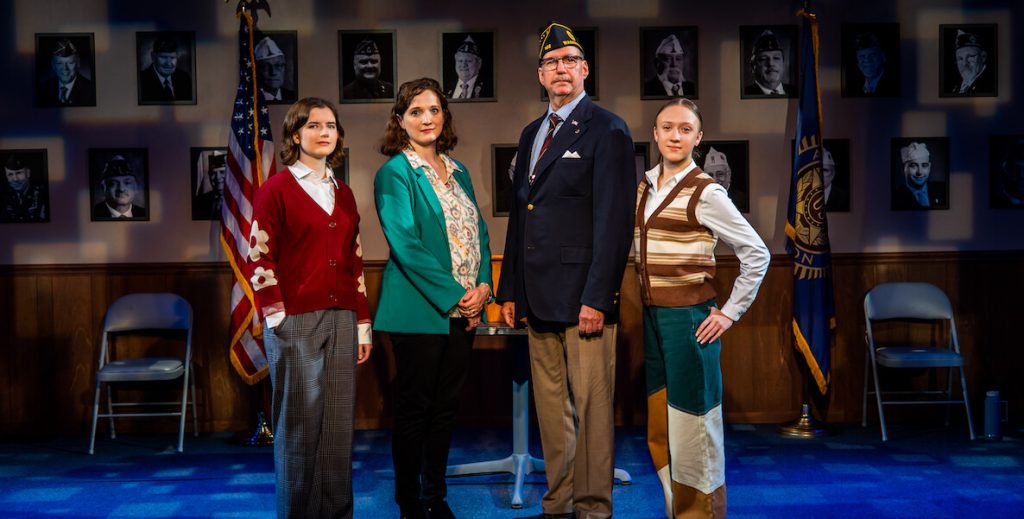When I went to see the play What the Constitution Means to Me at Arden Theatre Co., I thought about how, just a few blocks over in Independence Hall, our founding document was written and signed. The play is by no means a history lesson, however. It shares stories that we probably would not hear during a tour through our historic district. Jennifer Childs, director of the production at The Arden, says the play “puts a very human face” on the Constitution, which we otherwise might think of as just a legal document from which we are at a great distance.
The play is written by Heidi Schreck, who (as the central character) tells about her experience traveling the country as a teenager, entering public-speaking competitions about the Constitution for scholarship money. As Schreck resurrects the speeches she gave in those competitions — the play time-jumps from when she was 15 to the present day — she shares stories and her personal connections to the Constitution that she didn’t make when she was younger.
She talks about women in her family who were victims of domestic abuse. Her great-great-grandmother Theresa, an immigrant from Germany who came to the U.S. when she was ordered from a marriage catalog, and died of melancholia at 36. Her Grandma Bette, whose second husband was abusive to Bette and Schreck’s mother and aunts. She also tells of a Supreme Court case, Castle Rock v. Gonzales, in which the court came to a 7-2 decision that a local police department had no constitutional obligation to protect a mother and the lives of her three kids by enforcing the restraining order she had against her estranged husband.
In telling these stories, Schreck wants us to consider: What does it mean if the Constitution does not offer these protections against violence to women? What does it mean for Black women, women of color, trans women, nonbinary trans folks, immigrants, Shreck points out, who are less likely to be helped by police than she is, as a White woman? Schreck does not only raise the question with respect to domestic violence — the story she tells about driving to a town eight hours away from her own to get an abortion is one that’s related to the 9th Amendment, which a Supreme Court Justice (who was having an affair with a younger woman) brought up to argue the right to marital privacy in use of contraceptives in the case Griswold v. Connecticut.
Jessica Bedford, who plays the role of Schreck at The Arden, says each story highlights the impact the Constitution has in our everyday lives. “The language itself is the pebble dropping into the pond, but the meaning and the way that it affects our lives, ripples out from that.”
“I think many times in audiences you’re asked to sit back and receive. And this, just like the experiment of democracy itself, you’re asked to be vocal and participate.” — Jennifer Childs
In the second part of the show, no longer playing Schreck, Bedford introduces herself to the audience as Jessica, and is joined on stage by a high school student, to hold a debate. (On the night I attended the show, the young debater was Masterman student Lily Chancey.) The question they are arguing: Should we keep or abolish the Constitution? ‘
As they argue their assigned sides (as determined by a coin toss), the audience is invited to participate by making some noise whenever we agree or disagree. “I think many times in audiences you’re asked to sit back and receive. And this, just like the experiment of democracy itself, you’re asked to be vocal and participate,” says Childs.
Bringing a young person out to debate is also meant to make the audience think with more intent and urgency about what we heard in the first half of the play. “I can see a world where [Schreck] said, you know what, I’m just gonna leave it with part one,” says Bedford. “But to bring out this younger person and say, wait, wait, wait, this is their future that we are currently in charge of helping and shaping and aiding along, now what do you think about all of these things, these questions that we’ve been examining and talking about for the last hour?”
The show doesn’t leave us with the debate. Bedford and Chancey sit across from one another on stage to ask questions to better know each other as people. Questions like: What’s something that is bringing you joy right now? What’s your favorite song? If you could only hold onto a couple of your most loved possessions, what are they?
Bedford said this last part of the show helps the audience get to know the two people on stage, too.
The function of those questions is to say, Okay, you’ve just seen me step into a character for the last hour and a half; you’ve just seen me share that character’s views and life stories. And maybe some of that is not stuff that you agree with. And so it’s gonna be really tempting for you — even though that’s Heidi, the character, not necessarily Jessica, the person — to ‘other’ me. So, let’s take a second and talk about something … so that you can see me, see Lily, see Dasha [the second high school debater], as a person. Even if you’ve just disagreed with us rather strongly for the last 10 minutes. See us as people. Understand Dasha’s complete enamoration with Harry Styles. Understand the way that Lily knows every rollercoaster in the United States inside and out. Listen to me talk about my garden and my life and my teaching and stuff like that, and now try to other me. I think it will be tougher.
What the Constitution Means to Me, through December 10, $30-$60 per ticket, Arden Theatre Company, 40 N. 2nd Street

